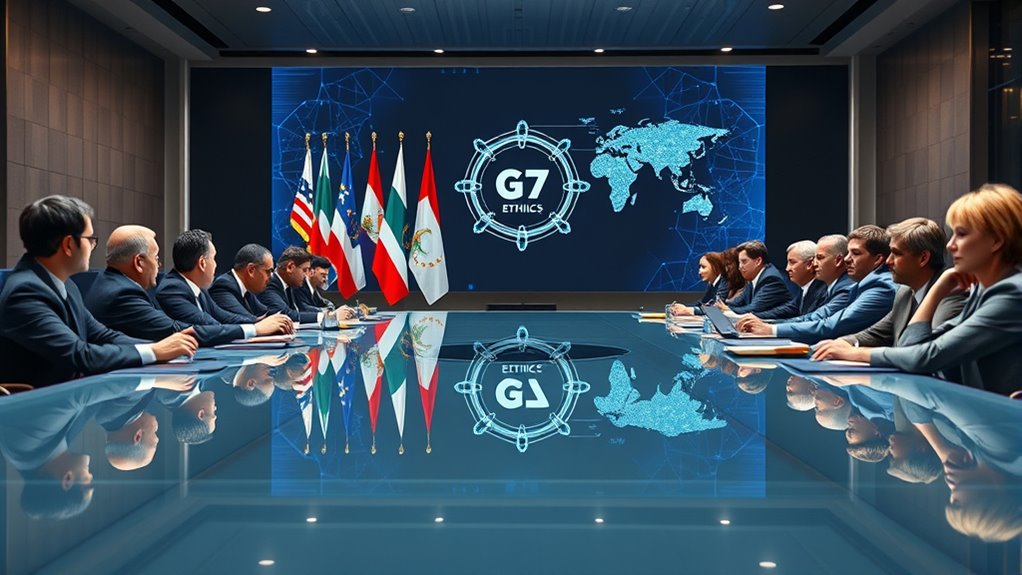Global AI regulation relies on international cooperation to align ethical standards, legal frameworks, and shared responsibility. The G7 principles emphasize transparency and accountability, while the EU AI Act sets strict rules based on risk levels. Beyond these, ongoing efforts aim to create common standards that address safety, fairness, and human rights globally. If you want to understand how these initiatives work together to shape responsible AI development worldwide, you’ll find more insights ahead.
Key Takeaways
- International cooperation is essential to develop unified AI standards that ensure safety, ethics, and human rights across borders.
- G7 principles emphasize transparency, accountability, and ethics, forming a foundation for global AI regulation efforts.
- The EU’s AI Act classifies AI systems by risk, enforcing strict rules on high-risk applications to protect fundamental rights.
- Harmonizing national regulations through multilateral agreements prevents safety gaps and promotes responsible AI development globally.
- Embedding ethics and cultural awareness in AI oversight fosters trust and ensures AI serves diverse societal values responsibly.

Have you ever wondered who should oversee the rapidly advancing field of artificial intelligence? As AI technology accelerates, establishing effective regulation becomes critical to guarantee it benefits society while minimizing risks. This responsibility isn’t solely on one country’s shoulders; it requires international cooperation rooted in shared values like AI ethics. When nations collaborate, they create a unified framework that guides AI development responsibly and fairly. International cooperation helps prevent a fragmented approach where some countries might prioritize innovation over safety, leading to gaps in oversight that could be exploited or cause harm. By working together, governments, organizations, and experts can develop common standards, share best practices, and enforce regulations that uphold human rights, privacy, and safety across borders. The G7 principles exemplify this global effort. They emphasize the importance of transparency, accountability, and ethical considerations in AI deployment. These principles serve as a foundation for member countries to align their policies and encourage responsible AI innovation worldwide. The G7 recognizes that AI ethics — including fairness, inclusivity, and respect for human dignity — should guide regulation, not just technological feasibility. Such an approach underscores the importance of international cooperation in setting norms and standards that transcend national interests, ensuring AI development adheres to universally accepted ethical principles. Meanwhile, the European Union’s AI Act advances these ideas by establishing exhaustive legal frameworks designed to regulate AI systems within its jurisdiction. It classifies AI applications based on risk levels, imposing strict requirements on high-risk systems to safeguard fundamental rights. The EU’s approach highlights the need for proactive regulation that prevents potential harms before they occur, emphasizing transparency, traceability, and human oversight. These regulations aim to foster innovation while protecting citizens from misuse or unintended consequences. As AI continues to evolve, it’s clear that a patchwork of national rules won’t suffice. Instead, ongoing international dialogue and cooperation are essential to develop harmonized standards, ensuring AI’s benefits are shared globally and its risks contained. Whether through multilateral agreements, treaties, or collaborative initiatives, nations must work together to shape a future where AI serves humanity’s best interests. Ultimately, overseeing AI’s growth isn’t just about technological regulation, but also about embedding ethics into every phase of development. International cooperation acts as the backbone of this effort, fostering trust and shared responsibility as the world navigates the complexities of AI innovation. A crucial aspect of this is promoting Cultural Intelligence among policymakers and developers to ensure culturally sensitive and ethically sound AI systems. By aligning efforts through global standards and ethical principles, we can ensure AI remains a force for good, respecting human rights and promoting sustainable progress worldwide.
Frequently Asked Questions
How Will AI Regulations Impact Innovation and Startups?
AI regulations will shape your innovation by emphasizing ethical considerations, which can both challenge and guide your startup’s development. While regulations might slow down some processes, they also promote responsible innovation, creating a fairer market. You’ll need to balance compliance with creativity, ensuring your ideas align with ethical standards without stifling progress. Ultimately, these regulations aim to foster a sustainable environment where innovation thrives responsibly.
What Are the Penalties for Non-Compliance With AI Laws?
If you don’t comply with AI laws, you face serious legal consequences, including hefty fines and sanctions. Enforcement measures can involve audits, inspections, and even criminal charges if violations are severe. Non-compliance risks damaging your reputation and losing trust with users. Staying ahead of regulations helps you avoid these penalties, ensuring your AI systems remain lawful and your business stays secure and compliant in a rapidly evolving legal landscape.
How Do Regulations Differ Between Countries and Regions?
You’ll notice regulations differ across countries and regions, influenced by cultural considerations and priorities. Some prioritize privacy, others focus on innovation or safety. Cross border cooperation becomes essential to harmonize standards and address jurisdictional challenges. You should stay informed about regional rules, as compliance varies. Embracing these differences helps you navigate international AI deployment, ensuring your systems respect local norms while benefiting from global cooperation efforts.
Will Regulations Address AI Bias and Fairness Issues?
Think of AI regulations as a lighthouse guiding ships through foggy waters. They aim to illuminate issues like algorithm transparency and ethical considerations, addressing bias and fairness head-on. While some regulations set strict standards, others focus more on encouraging responsible development. Your role is to stay informed, knowing that regulations will increasingly demand transparent algorithms and fair practices to guarantee AI benefits everyone without unfair bias.
How Will Regulations Evolve With Rapid AI Advancements?
Regulations will evolve quickly to keep pace with AI advancements, requiring ongoing updates to address emerging ethical considerations. You’ll see increased international cooperation, ensuring consistent standards across borders. As AI becomes more powerful, regulations will focus on transparency, accountability, and fairness. Staying adaptable is key, so policymakers will regularly revise rules to balance innovation with ethical responsibilities, helping you develop and deploy AI responsibly in a rapidly changing landscape.
Conclusion
If the G7 principles, EU AI Act, and other regulations don’t tighten the reins, AI could run amok and turn our world upside down! You might find yourself living in a sci-fi movie where robots call the shots, and privacy becomes a fairy tale. So, buckle up and stay alert—these rules aren’t just paperwork; they’re the superhero shields protecting us from an AI chaos invasion! The future depends on what we do today.










